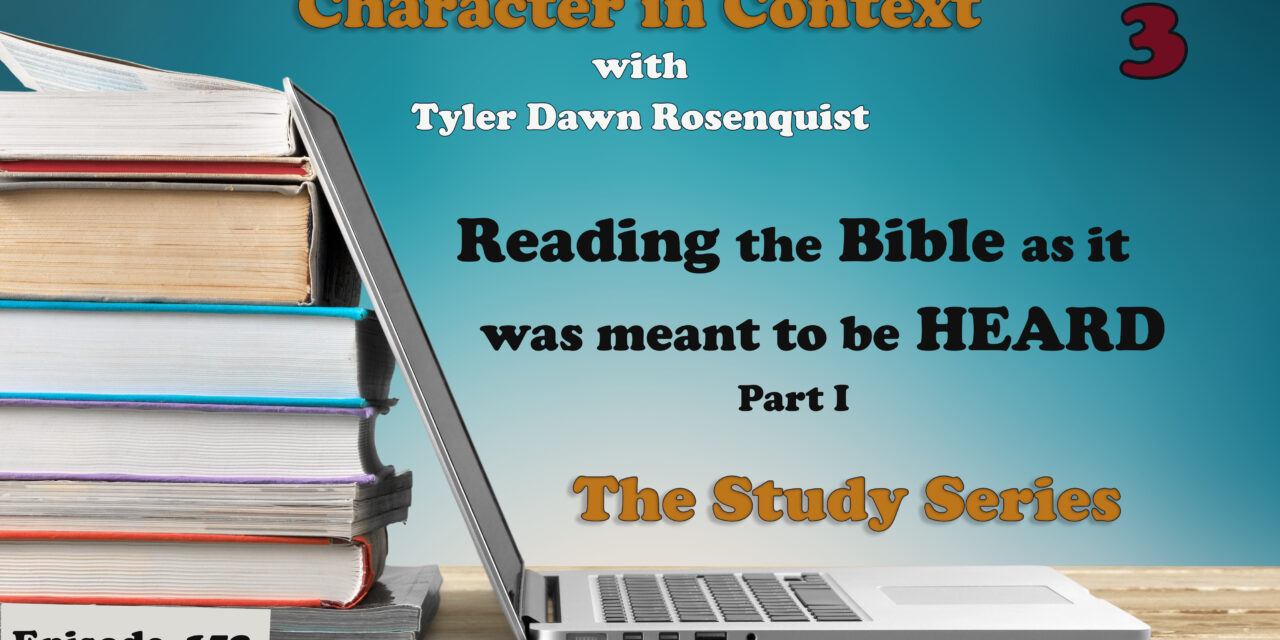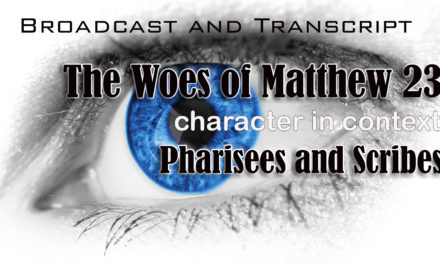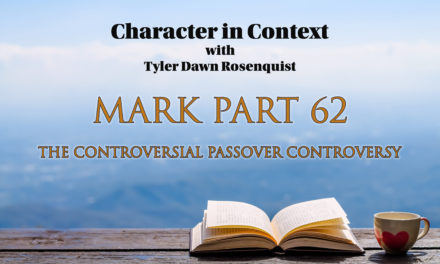I can’t stress enough how important it is to understand the ancient Hebrew view of authority and what makes a text inerrant and what does not. We’re going to start exploring what it means to the Body corporately and to us as individuals when we are aware that the Bible was never written to be read but to be heard. It means, among other things, that we have to look at the Bible as a community text and not as a personal one. Neither is it a scientific text. Neither was it finally written down in order to be read but instead to be archived. What is the Bible and what was it never intended to be?
(My affiliate links for Amazon products are included in the post. As an Amazon Associate, I earn from qualifying purchases.)
If you can’t see the podcast player, click here.
Hi, I am Tyler Dawn Rosenquist and welcome to Character in Context, where I usually teach the historical and ancient sociological context of Scripture with an eye to developing the character of the Messiah. But not right now, right now I am doing a series about how to not waste your time with bad study practices, bad resources, and just the general confusion that I faced when I started studying the Bible and was trying to figure out what to do and whose books I should read. Bottom line, I read a lot of nonsense and spent a ton of money on it. I am going to give you some basics on how to avoid a lot of the pitfalls, save money, maximize your time and effort, and get the most out of what you are doing.
Master book list can be found here and I will add to it as needed.
So, we are a text-based society and have been for hundreds of years now. And by that, I am not talking about cell-phone culture. I am talking about books, books which depend on a literate society to propagate, the technology needed to develop books, and the mindset that tells us that if something is written down, that it is more authoritative and reliable than what we hear. But I am going to tell you something that may shock you—those are all new attitudes and realities historically. And that means that a lot of our assumptions about the authority of the Bible have to be tweaked so that we can really grasp what the Bible is trying to communicate and how it goes about doing that. But more than that, we also have to realize that the world of the Hebrew Scriptures and especially the literary world, was in some ways profoundly different than the Greco-Roman world which gave us the First Century Scriptures. To read Scripture as they would, then, requires that we be aware of how they communicated in different times, how they viewed things like authority and inerrancy, and what a written copy of the Bible would have meant to them versus what it means to us. But I don’t want you to be intimidated—our ancestors changed the rules and now we just assume that it has always been viewed the exact way that we view things. And I will have recommended books at the end of this podcast, and they will be in the transcript with affiliate links if you would like to support the ministry—or if you just don’t want to write everything down!
In the ancient Near Eastern world, and that would be what scholars call the entire known world in the times when the events of the Hebrew Scriptures took place—Egypt, Canaan, Arabia, Assyria, Babylon, and modern-day Turkey—books were rare and wouldn’t even be recognized as books. Think more like baked clay cuneiform tablets—and they weren’t written down in order to be read but instead to be preserved. This was an oral culture, but I don’t want anyone to make the mistake of thinking that being illiterate was a sign of being unintelligent or being any kind of a disadvantage in the ancient world. To be a scribe was simply to have a specialist job and very few were needed because writing things down was usually not a priority and they were written to be stored. Stories were told, using rhetorical tricks that made them easier to remember and transmit. In the ancient Near East, writing developed largely because of religion. Communication from the divine was recorded, magic and rituals were written down, and there are, of course, many monuments out there with sometimes lengthy inscriptions.
Another way of describing a culture like this would be to call it hearing dominant. Because of this, they trusted what they heard and not what might be written down somewhere. Think of it this way—hearing is a community thing. They would hear stories together, year after year and generation after generation. Someone might have snips and bits of vellum (animal skin) or papyrus or clay tablets tucked away somewhere with either the story or the general outline of the story but people weren’t really interested in fact checking it. Reading is an individualistic exercise and so is writing. So it was just not something people thought about needing. What they did develop in time were archives, libraries and school texts. Archives might record genealogies or state documents or might be devoted to temple concerns—like rituals and such and quite a few of these (like over a hundred thousand) have been unearthed over the past 150 years in places like Iraq, Syria, Israel, and Egypt. That’s the nice thing about clay tablets. If they are stored someplace where the weather can’t get to them, they hold up very well for many thousands of years. Libraries are very different from what we know today. A library is where they stored written copies of things that would be spoken in public—things like the Gilgamesh epic, anything related to divination, rituals, prayers, word lists, etc. They weren’t open to the public, they were for learning and storage. But the contents of the library weren’t considered authoritative. The spoken word was authoritative. Oh, and the Library of Alexandra would have fallen into this category. But that needs a bit of clarification as well. We will get to that later because it is very important. Another thing that archaeologists find are school texts—works that existed to be copied by those learning to be scribes.
So, what about authority? What makes a story authoritative? We have already ruled out any written copy, that wasn’t how they looked at things. Even written copies of Covenant treaties were written and then stored away in temples and only brought out to be read on specific occasions. Authority came from the source and not from letters on “paper”. When a prophet was out and about and spoke, for example, the prophet was not the authority—Yahweh was. But the prophet wasn’t writing these things down usually, although a scribe like Baruch might. Likely, these words that we see written down in Isaiah—the woes and the promises—were spoken many times in many places as the prophet traveled throughout the Kingdom. It would rarely be a one and done because that isn’t how prophecy function—only to be heard once and if you weren’t there then you missed it. Jeremiah actually had to be told to write a scroll for the King, because it was something out of the ordinary. But this was an oral culture and people had excellent memories. But beyond a prophet speaking for Yahweh, how else would authority have been determined?
When we read the Torah, and when they heard the Torah, it carried weight with them because it was attributed to Moses. Moses was the authority. Not because it was written down, they didn’t care about that for a very long time—not until late Greco-Roman times and not even in the first century. And it might sound crazy to us because we tend to panic if things aren’t written down so that they can be read and so that we have like the one true copy. But to them, what really mattered was the content, the story it told. What was required of them? How was their cultural identity being maintained and communicated? How did they hear it, out loud, as a corporate entity—a completely interconnected community with a shared past, present, and future? You see, we don’t think that way anymore. We go off with our Bibles and we study them in private, and think about it in private, and think to ourselves, “what does it mean to me?” But they would have heard it as a group, talked about it as a group, and would have asked each other what it meant for the community. There was no such thing as private piety because everyone was affected by everything that everyone else did. That’s why if the leaders were corrupt then everyone was. There was no such thing as a private citizen. It was the group that interpreted what they heard, and not any one person—unless that one person was the king, of course—and when I mean the group, I mean the elders among the men. Patriarchy is the backdrop of the ancient Near Eastern world. You could be seventy years old but if your dad was still alive and spry, you still had to do everything he told you to.
Authority came from the source—be it the King, or a religious leader, or a prophet. Authority didn’t come from the scribe and so when we look at a book of the Bible and see a name, that isn’t the author. That’s the name of the traditional authority behind the book. Moses is the authority behind the Torah and we count them as authoritative because they are associated with him and his unique relationship with God—not because we have original documents with his signature on them—a document like that would be called an autograph and we don’t have any for anything in our Bibles. What we have are manuscripts, written and copied a long time later because it just wasn’t as important to them as it is to us. This is why, when we read the Torah, we will see things that were obviously added or edited in much later—like references to empires that didn’t yet exist (like the Chaldeans) or lands that wouldn’t bear that name for a long time later. So, when we hear of “Ur of the Chaldeans” as being Abraham’s place of origin, we have to understand that this was a clarifying note because there was more than one Ur in the ancient world. Just like there was more than one Antioch in the first century. Also, Moses didn’t write about his own death, obviously, someone else wrote that. And that’s okay because what the scribes were doing was recording all of the stories from Moses and about Moses into a single document, still, not to be authoritative but to preserve their culture and identity. Don’t get the idea that they made the stories up or that I am even suggesting it, just realize that they didn’t value the written word the way we do. They really didn’t think anything at all the way we do, about much of anything.
When these documents became important to the Jewish people, they still weren’t authoritative for a very long time. They were still for reading publicly, for disseminating the information from the original authority ie. Moses, Samuel, Isaiah, Jeremiah, etc. That it was written down meant that it was preserved, not that it was somehow more valuable or credible than what was spoken. But when they began to write these accounts down from the wealth of information available to them orally and from archives and such, the scribes had to make decisions—which I do believe were guided by the Holy Spirit, as to how to put it all together—not as a book but as a collection of writings recording the authoritative spoken traditions. And it wasn’t even until Rashi, less than a thousand years ago, that the individual words used were even considered to be important. By tradition, I don’t mean something that is made up, but “the transmission of customs or beliefs from generation to generation.” These generational stories were extremely important and vital to society and community identity. Getting them written down likely saved the Jewish people in exile, and that was likely the reason that the authoritative oral accounts were put together and stored this way—because no one comes out of exile with their national identity intact unless they really make a concerted effort. But they were written to be heard because that is how they were transmitted in the first place. Heard as a community, read to the community, experienced and acted upon as a community.
People in the ancient Near East were what is called “backward facing.” We are forward facing and so we have trouble understanding what it means to be firmly rooted in the past, in the way that our ancestors lived and believed and did things. Innovation was a tough sell because people were never sure how the gods would react to change. But they did have a good idea of how their gods or God had reacted (or seemed to react) to the way things had always been done. When we get to the Gospels, we will see this at play with the Pharisees and their oral traditions—not in written form because that was not valued but oral. And this is why they are attributed to Moses and to the Men of the Great Synagogue. If they said, “this is how we should do thing” then everyone would shrug and laugh at them because to speak with authority, one must appeal to authority. That’s why what Yeshua/Jesus did was so revolutionary. He didn’t do this. He broke the rules. He did a new thing. He spoke on His own authority without appealing to any other human being.
So, what were scribes in the ancient world allowed to do with the material they were writing down and/or copying? They were allowed to change place names if those places no longer had the same name—ie. Ur of the Chaldeans in Gen 11:28, or referring to the land of Dan in Genesis 14 before Dan was even born. This isn’t blasphemy, it was making the text clearer for the times. Scribes could make changes to reflect innovations in language. Words change meaning—gay being the most obvious example in our own times. Scribes could add additional materials to an account—like including the death of Moses tacked on to the material that originated with him or whenever it says, “and it remains until this day”—that obviously applies to the time of editing and we can’t say it is still true now. Changes to the laws—which is why the laws of Deuteronomy are often different from Exodus. As society changed, laws needed to be clarified and altered to fit new situations while retaining the original authority. As attitudes changed, a scribe could add that in. Like the grandchild of a Moabite becoming king when it was expressly forbidden for one to even be a part of the nation in Deut 23:3. The original ruling wasn’t edited out, so we still have it, but with David came a new attitude and reality.
This editing of things together into larger collections is most obvious in the Psalms where one hundred and fifty of these tidbits were gathered together, and Proverbs. Some works, like Job, Jonah and Ecclesiastes, Ruth and Esther, were obviously written all at once because they make a cohesive story—they are very different from the Torah or from I and II Samuel which make up much longer narratives that took place over a great many years. Which leads me to why it is important to understand the Bible on it’s own terms and not according to how we think they should have seen it—namely as authoritative simply because we have the “one true” written copy. Honestly, people would fight a lot less if we would allow the Bible to be what it is and all of us change our thinking instead of judging it based on our modern ideas about what is and is not good.
Yahweh gave His instruction, exhortation, rebuke, and wisdom to an oral culture. That was His choice. That’s where they were and so that is where He met them. He didn’t wait for them to become interested in science and technology or to become a textual culture. He met them in a polytheistic world which attributed everything to a myriad of gods and goddesses and other divine beings who ran the world from inside the system; gods who didn’t create the system themselves but lived at the mercy of it and were prisoners of fate just like everyone else. They were a people who believed what they thought they saw, and who came up with some madly clever ways of understanding how things worked. These people weren’t stupid or uneducated, they were just limited by their worldview and experiences. This was a survival-focused society. Science, invention, reading, writing—those are the indulgences of people who aren’t worried about what they are going to eat or actually working for a living. It hasn’t been until modern times that such a society could even be supported or maintained.
Because of all this, the Bible is from front to back a book of cultural accommodation. What this meant and what this still means today in our own dealings with Yahweh, is that He takes us as we are and where we are and deals with us in that place and according to what we think we know and what we accept to be true. I am a chemist by education, but I don’t know a single chemist who believes that we have a firm handle on all things scientific—we are always learning more and tweaking our understandings. We are still toddlers compared to God and His knowledge of the universe. If it is true for us, then it is mores o for them. And so, the Bible isn’t a scientific manual. If it sometimes gets things right or seems to (usually it only seems to once we understand how they meant it), well, it’s completely by accident or we are misinterpreting their intentions in the way they state things. The Bible, from front to back, is a book about revealing Yahweh and His rescue plan for creation. That’s what it is. It doesn’t reveal science. And even if it tried—which understanding would it try to teach? Theirs, the understanding during the time of Yeshua, ours, or the understandings of our great-grandchildren who will likely shake their heads at what we thought we knew back in the day? Only non-scientists make the mistake of believing that we have anything close to all knowledge right now. Scientists, on the other hand, are still awed by our communal ignorance of how things work. Imposing post enlightenment prejudices and warping the text under the auspices of defending it—and spending precious time trying to find science is time wasted that could have been spent on why God actually gave us the Scriptures. Authority shouldn’t ever be confused with being accurate about everything, that wasn’t even remotely how they thought about such things.
Cultural accommodation is a fancy way of saying what many scholars tell us—that although the Bible was written for our benefit, it wasn’t written to us, with our mindsets and experiences and society in mind. It was written within a polytheistic world, to people who understood idolatry and the worldview that associated the running of the universe with deities performing cosmic functions that kept everything running, instead of a stunningly well-designed universe that pretty much runs without any help from Yahweh at all because He is just that talented. No one, for example, has to open windows in the sky to make it rain, even though that is exactly what people used to believe. That isn’t a pagan belief, but a pre-scientific belief of people who understood cause and effect but didn’t understand a self-sustaining complex universe that was designed to work that way. What the outside world would attribute to deities, the Bible and extra-biblical writings might attribute to angelic messengers. Not to deceive but as a necessary vehicle to bring understanding of Yahweh’s provision in terms they could grasp.
And I wrote too much for this one and ran out of time so we will pick up where we left off in two weeks, after my yearly Yom Kippur message. See you then!
General resources that are excellent and readable from some of my favorite scholars
(My affiliate links for Amazon products are included in the post. As an Amazon Associate, I earn from qualifying purchases.)
Walton, John The Lost World of Scripture: Ancient Literary Culture and Biblical Authority
Lightfoot, Neil How We Got the Bible
Bird, Michael Seven Things I Wish Christians Knew About The Bible
Keener, Craig and Walton, John NIV Cultural Backgrounds Study Bible





















